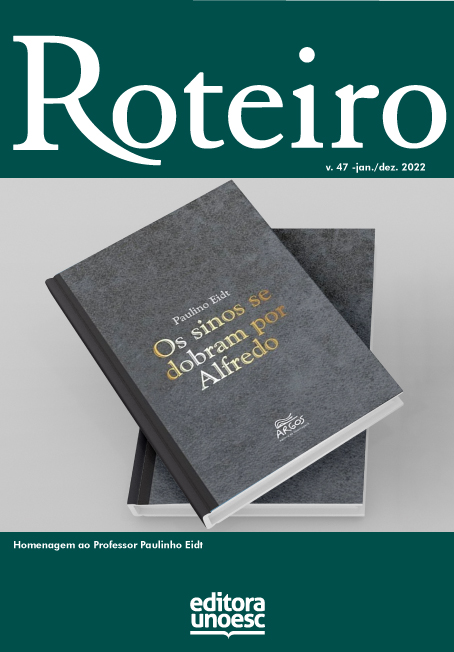Emergency remote learning and the mediation of Libras interpreters in the municipality of Timon - Maranhão
DOI:
https://doi.org/10.18593/r.v47.27745Keywords:
Pandemic, Deaf, InclusionAbstract
The aim of this paper is to discuss the inclusive strategies adopted by interpreters of deaf students, through a case study carried out in the city of Timon, in the state of Maranhão, to understand and guide the pedagogical approach under a perspective of inclusion. The work is set in the context of emergency remote learning, in the 2020 school year, which has been altering the interactive processes between students and teachers, impacting on inclusion and learning actions. The research has a qualitative nature and the methodological procedure used was a comprehensive and focused interview, carried out with teachers and interpreters for data collection, analysis and interpretation in order to investigate the following problem: how was the inclusion of deaf students in the pandemic context? The theoretical background that guides this work is centered on Vygotsky's (1991) writings on social interactionism and language acquisition, in addition to Mantoan (2017), who presents studies on inclusion; Quadros (2003; 2005), who discusses inclusion of deaf people, and Freire (1987), who proposes student protagonism. The results demonstrate that school activities, mediated by technology, reveal how far we are from becoming a society that is committed to inclusive education and that becoming an inclusive teacher requires training and behavioral change.
Downloads
References
ARENDT, H. Entre o passado e o futuro. 7. ed. São Paulo: Perspectiva, 2013.
BRASIL. Decreto-lei n. 5.626, de 22 de dezembro de 2005. Diário Oficial da União, Brasília, DF, 23 de dez. 2005, Seção 1, p. 30. Disponível em: http://www.planalto.gov.br/ccivil_03/_ato2004-2006/2005/decreto/d5626.htm. Acesso em: 02 fev. 2022.
BRASIL. Lei n. 10.436, de 24 de abril de 2002. Diário Oficial da União, Brasília, DF, 25 de abril de 2002. Disponível em: http://www.planalto.gov.br/ccivil_03/leis/2002/l10436.htm. Acesso em: 02 fev. 2022.
BRASIL. Ministério da Educação. Política nacional de Educação Especial na perspectiva da educação inclusiva. Brasília, DF, 2008.
FERNANDES, L. B.; SCHLESENER, A.; MOSQUERA, C. Breve histórico da deficiência e seus paradigmas. Revista do Núcleo de Estudos e Pesquisas Interdisciplinares em Musicoterapia, Curitiba, v. 2, p. 132-144, 2011.
FREIRE, P. Pedagogia da indignação: cartas pedagógicas e outros escritos. 1. ed. São Paulo: Editora UNESP, 2000. DOI: https://doi.org/10.1590/S1414-32832001000100016
FREIRE, P. Pedagogia do oprimido. 17. ed. Rio de Janeiro: Paz e Terra, 1987.
GIL, C. A. Métodos e técnicas em pesquisa social. São Paulo: Atlas, 2008.
LUCKESI, C. C. Avaliação da aprendizagem na escola e a questão das representações sociais. EccoS Revista Científica, São Paulo: Universidade Nove de Julho, v. 4, n. 2, p. 79-88, dez. 2002. DOI: https://doi.org/10.5585/eccos.v4i2.310
MANTOAN, M. T. E. Inclusão, diferença e deficiência: sentidos, deslocamentos, proposições. Revista Inclusão Social, Brasília, DF, v. 10, n. 2, p. 37-46, 2017. DOI: https://doi.org/10.22478/ufpb.1981-0695.2018v13n2.43010
MORAN, J. Mudando a educação com metodologias ativas. In: SOUZA, C. A. de; MORALES, O. E. T. (org.). Coleção Mídias Contemporâneas. Convergências Midiáticas, Educação e Cidadania: aproximações jovens. PG: Foca Foto-PROEX/UEPG, 2015. v. 2. Disponível em: http://www2.eca.usp.br/moran/wp-content/uploads/2013/12/mudando_moran.pdf. Acesso em: 02 fev. 2022.
MORAN, J. Metodologias ativas e modelos híbridos na educação. In: YAEGASH, S. e outros (org.). Novas Tecnologias Digitais: Reflexões sobre mediação, aprendizagem e desenvolvimento. Curitiba: CRV, 2017. p. 23-35. Disponível em: http://www2.eca.usp.br/moran/wp-content/uploads/2018/03/Metodologias_Ativas.pdf. Acesso em 02 fev. 2022
QUADROS, R. M. Situando as diferenças implicadas na educação de surdos: inclusão/exclusão. Revista Ponto de Vista, Florianópolis, n. 05, p. 81-111, 2003.
QUADROS, R. M. Políticas linguísticas: as representações das línguas para os surdos e a educação de surdos no Brasil. In: II CONGRESSO NACIONAL DE EDUCAÇÃO ESPECIAL – II ENCONTRO DA ASSOCIAÇÃO DE PESQUISADORES DA EDUCAÇÃO ESPECIAL, 2005. Anais [...]. 2005.
SCHLEMMER, E.; DI FELICE, M.; SERRA, I. M. R. S. Educação OnLIFE: a dimensão ecológica das arquiteturas digitais de aprendizagem. Educar em Revista, Curitiba, v. 36, e76120, 2020. DOI: https://doi.org/10.1590/0104-4060.76120
VYGOTSKY, L. S. A formação social da mente. São Paulo: Martins Fontes, 1991.
VYGOTSKY, L. S. (1896-1934). Pensamento e linguagem. Edição Eletrônica: Ed. Ridendo Castigat Mores, 2001.
ZAGO, N. A entrevista e seu processo de construção: reflexões com base na experiência prática de pesquisa. In: ZAGO, N.; CARVALHO, M. P.; VILELA, R. A. (org.). Itinerários de pesquisa. Rio de Janeiro: DP&A, 2003.
Published
How to Cite
Issue
Section
License
Copyright (c) 2021 Lílian de Sousa Sena, Márcia, Ilka

This work is licensed under a Creative Commons Attribution 4.0 International License.
Copyright Notice
The authors retain copyright and grant the Journal the right of first publication, with the work simultaneously licensed under a Creative Commons – Attribution – 4.0 International license.












